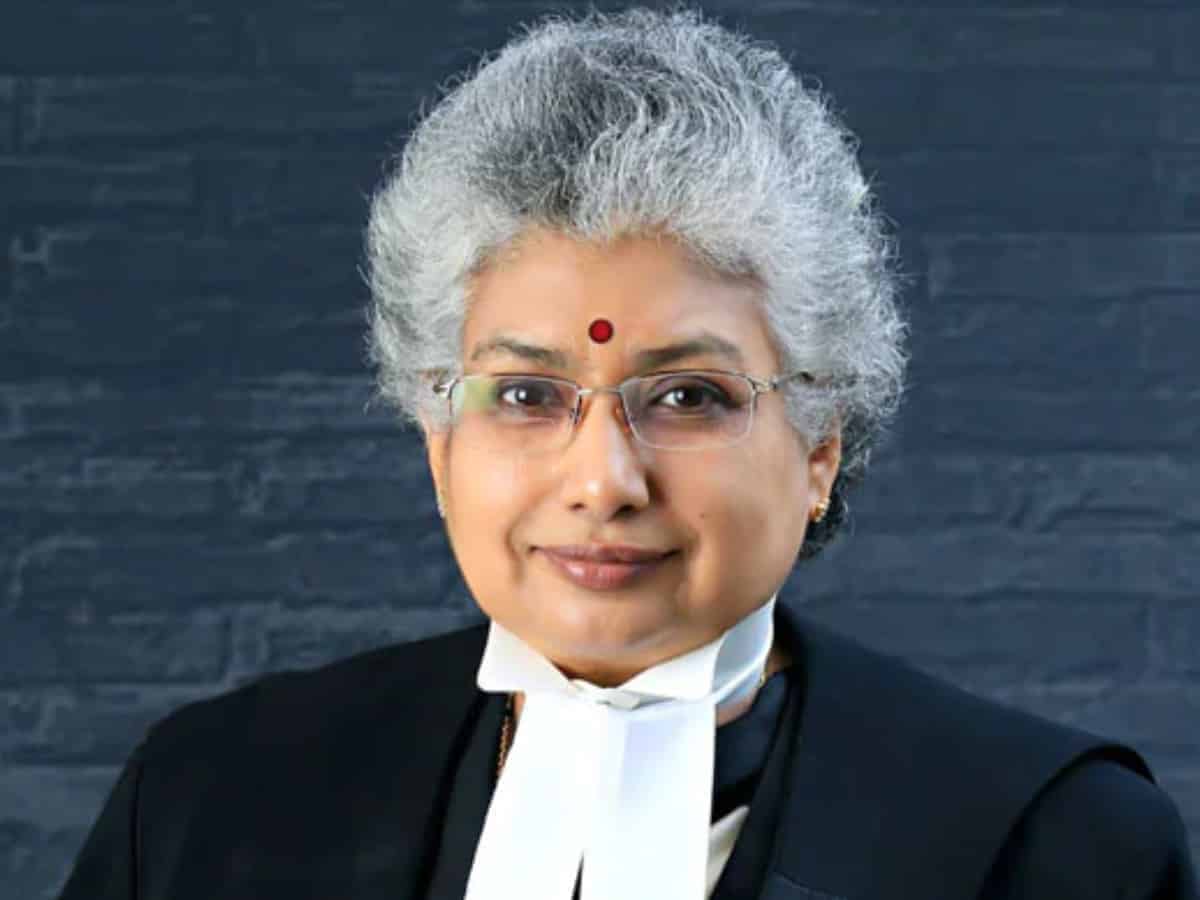
New Delhi: The judiciary has played a yeoman’s role in the noble endeavour for gender equality and affirmative action to enhance representation of women in all spheres of public life is a bounden duty of all organs of the State, Supreme Court judge Justice B V Nagarathna said on Friday.
Speaking as the chief guest at the 28th Justice Sunanda Bhandare memorial lecture, she spoke on “The Role of the Judiciary in the Empowerment of Indian women” and referred to her own judgements on the subject.
Justice Nagarathna, who is slated to become the first woman Chief Justice of India in 2027, batted for participation of women in the judiciary, saying it is not only a constitutional imperative but also a necessary step towards achieving the goal of a robust, transparent, inclusive, effective and credible judicial process.
“The Indian judiciary has played a yeoman’s role in the noble national endeavour for gender equality,” she said, and referred to her judgments wherein she had held that the term “individual” should also include “woman”.
She was referring to a provision under the Income Tax law where an individual Sikkimese was entitled to tax exemption. Strangely, women were not covered under the provision, which she struck down with her judgement last year.
“The freedom movement and our founders imagined a new Indian woman with complete individuality and self sufficiency. Yet, we are yet to see who the new Indian woman is,” she said.
Justice Nagarathna said the the judiciary has subjected gender-biased laws, policies and norms to constitutional scrutiny and courts, as guarantors of equal protection, have played a critical role in ensuring that non-discrimination and fairness emerge as the central governing principle of state policy in all spheres of public life.
“The participation of women in the judiciary is not only a constitutional imperative but also a necessary step to achieve the goal of robust, transparent, inclusive, effective and credible judicial process,” she said, while lauding the contribution of Late Justice Sunanda Bhandare to the Indian judiciary.
She said another facet of the judiciary’s role in furthering the cause of gender equality is emphasising the constitutional mandate of laws and policies enacted for the empowerment and emancipation of women, or for prevention of violence and exploitation against them.
“Equality would be reduced to a mere slogan in the absence of persistent and targeted state action for the empowerment of women. It bears repetition that despite social reform and progress, the social structure remains biased against women. Such bias is pernicious that it afflicts women from womb to tomb,” she said.
She added, “Affirmative action to enhance the representation of women in all spheres of public life is a bounden duty of all organs of the State.”
Justice Nagarathna said the cornerstone of the constitutional mandate of affirmative action are the provisions for equitable representation of women in the political realm and, most importantly, in local self-governance institutions.
“One of the achievements that every Indian can be proud of is that we have the largest number of elected women representatives in the world. Judiciary has played a key role in reinforcing the principles of representative governance,” she said.
Justice Nagarathna emphasised that equal property rights can promote greater social equality between men and women and this can help to reduce harmful gender norms that contribute to domestic violence, such as the belief that men have the right to control women.
“The judiciary has crafted creative remedies to redress systemic injustice and exploitation of women and taken up the role of an initiator of societal reform and transformation,” she said, adding, “Personally speaking, I find cultural norms that see women as inferior to men to be highly unscientific, irrational and inefficient.”
Justice Nagarathna, referred to the special laws enacted by Parliament and said the Pre-Conception and Pre-Natal Diagnostic Techniques Act, 1994 reflects this commitment to preventing female foeticide.
“In this regard, the judiciary is duty-bound to strengthen the hand of other organs of the State to optimize the achievement of the hallowed constitutional objective of equality of women,” she said.
She also referred to the enactment of the Protection of Women from Domestic Violence Act and said women MPs especially emphasised how it was critical to ensure access to justice for women to strengthen democracy in our household.
“There is no gainsaying the fact that the most enduring protection against economic exploitation within households is the financial independence of women…. That is why the 2023 Global Gender Gap report pegged the gender gap score at 68.4%, and said it would take 131 years to equalise earnings between men and women at the current rate of progress,” she said.
She added that for many centuries the institution of marriage and family has been nurtured by the “toiling labour and incommensurable care work of women as mothers, wives, sisters, daughters, aunts, and so forth”.
“Both women and men must realise that they are the pillars of the institution of marriage. Different pillars serve different but equally important purposes. No family can subsist without a healthy balance of economic or care work. A condescending attitude towards women in the family is the cause of the cracks and domestic violence and infidelity are the outcome of the emerging cracks,” she said.



